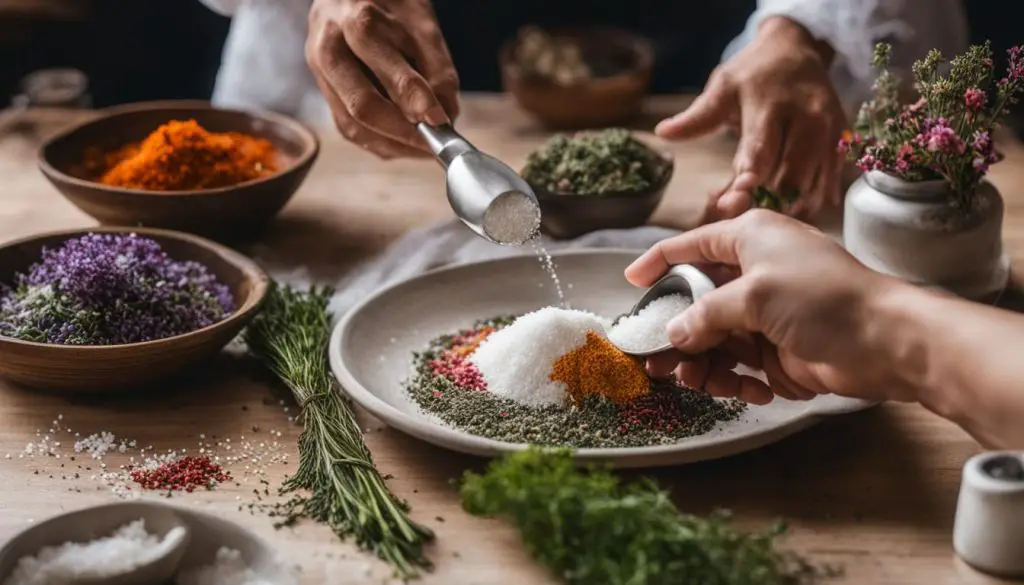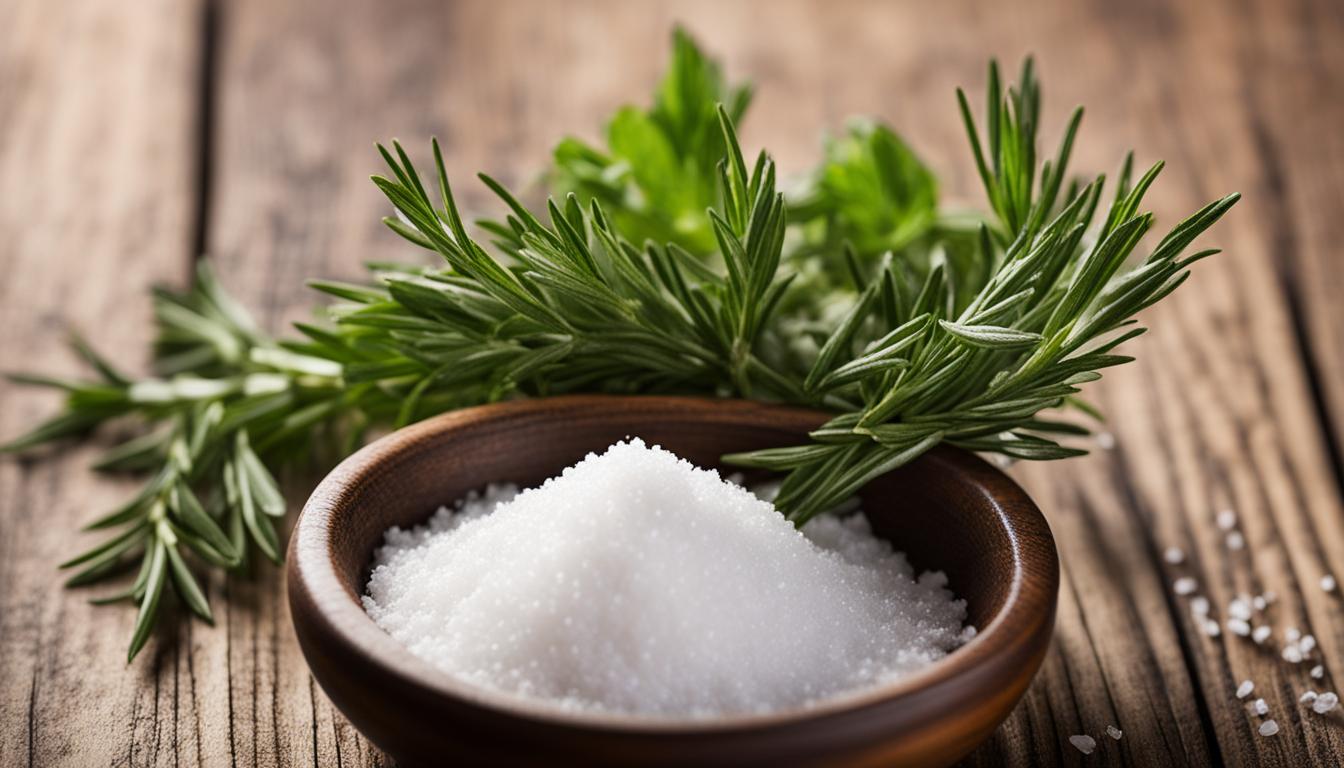Salt has always held a special place in human history, with its significance extending beyond its use as a simple seasoning. Across cultures and traditions, salt has been associated with good luck and considered a symbol of fortune. From ancient rituals to modern-day customs, beliefs surrounding salt and luck continue to shape our understanding and practices. In this article, we will delve into the fascinating world of salt, exploring its historical importance, superstitions, seasoning properties, and cultural significance. Join us on this journey as we uncover the secrets behind salt’s role in beliefs and traditions.
Contents
- 1 The History of Salt
- 2 Salt as a Superstition
- 3 The Health Benefits and Risks of Salt
- 4 Salt in Traditions and Customs
- 5 Conclusion
- 6 FAQ
- 6.1 Is salt considered a sign of good luck?
- 6.2 What are some superstitions related to salt?
- 6.3 How does salt enhance the flavor of food?
- 6.4 What are the different types of salt available?
- 6.5 What are the health benefits and risks associated with salt?
- 6.6 How has salt played a role in cultural traditions?
- 7 Source Links
Key Takeaways:
- Salt has been linked to good luck and considered a symbol of fortune in various cultures.
- It has a long and rich history, playing important roles in commerce, religious rituals, and culinary practices.
- Superstitions surrounding salt, such as spilling salt or throwing it over the shoulder, have been prevalent across different societies.
- Salt enhances the flavor of food and acts as a preservative, making it an essential ingredient in seasoning.
- There are different types of salt available, each with its own unique flavor and purpose.
Now that we have set the stage, let us embark on a journey through time and cultures to uncover the deep-rooted beliefs and traditions surrounding salt and luck.
The History of Salt
Salt has a long and rich history dating back to ancient times. It has been a vital element in numerous aspects of human civilization, including commerce, religious rituals, and traditional practices. The significance of salt in these domains reflects its essential role in various cultures and societies.
Throughout history, salt has played a crucial role in commerce. Its use as a trading commodity has driven economic activity and influenced the development of trade routes, such as the famous Salt Roads in ancient Rome. The value of salt as a commodity is evident in its ability to preserve food, enabling long-distance journeys and extended storage periods. In this way, salt has not only fueled commerce but also contributed to the growth and sustainability of societies.
Salt has also held great importance in religious rituals and practices. Its purifying properties have made it a symbol of spiritual cleansing and renewal. In many cultures, salt is used in ceremonies and offerings to deities, signifying purity and protection. The use of salt in religious rituals has deep historical roots and continues to be an integral part of many faiths and traditions today.
| Table: Historical Uses of Salt |
|---|
| Salt used as a form of currency |
| Salt as a trading commodity |
| Salt in religious rituals |
| Salt for food preservation |
Furthermore, the process of salt making has been refined over centuries, with various methods employed around the world. From ancient techniques like solar evaporation to more advanced methods like brine extraction and rock salt mining, the art of salt making has evolved to meet the needs of different societies. The ingenuity and craftsmanship involved in salt production highlight its significance as a valuable resource throughout history.
Overall, the history of salt is a testament to its enduring importance in human civilization. From its role in commerce and religious rituals to its various methods of production, salt has shaped cultures, traditions, and economies around the world. Understanding the history of salt provides valuable insights into the significance of this mineral throughout human history.
Salt as a Superstition
Salt has long been associated with superstitions and beliefs related to good luck and protection against evil spirits. In many cultures, spilling salt is considered unlucky, leading to various rituals and customs to reverse the bad luck. One common practice is throwing salt over the shoulder, which is believed to ward off evil spirits and undo the jinx. This superstition is thought to have originated from the idea that evil spirits lurk behind a person’s left shoulder, and throwing salt in that direction blinds them.
Spilling salt has been considered unlucky in many cultures, with various methods of undoing the bad luck, such as throwing salt on the fire.
Not only is salt used to counteract bad luck, but it is also believed to protect against evil spirits. In some traditions, people sprinkle salt in their new homes to cleanse the space and keep negative energy away. Carrying a small bag of salt or a salt crystal is also thought to offer protection against malevolent entities. Furthermore, borrowing salt and not returning the exact amount is seen as unlucky, as it is believed to disturb the balance of good fortune.

The Health Benefits and Risks of Salt
Salt, a common ingredient in many of your favorite dishes, plays a crucial role in regulating blood pressure and maintaining fluid balance in the body. However, like any other food, excessive salt consumption can pose risks to your health. Understanding the balance between the benefits and risks of salt is essential for making informed decisions about your diet.
The Role of Salt in Regulating Blood Pressure:
Salt contains sodium, a mineral that helps maintain the balance of fluids in your body. Sodium plays a vital role in regulating blood pressure by influencing how much water your body retains. When you consume too much salt, your body may retain excess water, leading to high blood pressure. On the other hand, consuming too little salt can cause low blood pressure and complications.
Risks of Excessive Salt Consumption:
While salt is necessary for your body’s functioning, consuming too much can have adverse effects on your health. High salt intake has been linked to an increased risk of developing high blood pressure, which can lead to heart disease, stroke, and kidney problems. It’s important to note that individuals with certain medical conditions, such as hypertension or kidney disease, may be more sensitive to the effects of salt.
Recommended Daily Salt Intake:
The American Heart Association recommends limiting your daily salt intake to less than 2,300 milligrams. However, for individuals with high blood pressure or other medical conditions, the recommended limit may be even lower. It’s important to check food labels and choose low-sodium options when possible. Remember that salt is not only found in table salt but also in many processed foods, so being mindful of your overall salt consumption is key.
Table: Health Benefits and Risks of Salt
| Health Benefits | Risks |
|---|---|
| Regulates blood pressure | Increased risk of high blood pressure |
| Maintains fluid balance | Higher risk of heart disease |
| Aids in nerve impulse transmission | Higher risk of stroke |
| Increased risk of kidney problems |
“It’s important to strike a balance when it comes to salt consumption. While it has its health benefits, excess salt intake can pose risks to your well-being. Be mindful of your overall salt consumption and aim to follow the recommended daily intake guidelines.” – Dr. Emily Johnson, Nutrition Specialist
Salt in Traditions and Customs
Salt has been deeply intertwined with various cultural traditions and customs throughout history. Its significance goes beyond mere seasoning, as it has played a vital role in religious ceremonies, food customs, and historical production methods. Exploring these cultural practices sheds light on the diverse ways in which salt has shaped societies and symbolized different aspects of life.
Salt in Religious Ceremonies
“Salt is considered a purifying element in many religions and is incorporated into various rituals. For example, in Christianity, salt is used to bless holy water, symbolizing purification and protection against evil spirits. In Hinduism, salt is often present in sacred rituals and offerings to deities, representing purity and auspiciousness. These religious connections highlight the spiritual significance of salt and its ability to bring sanctity to important ceremonies.”
Salt in Food Customs
Food customs and traditions involving salt can be found in cultures around the world. For instance, in Eastern European countries, bread and salt are offered to guests as a sign of hospitality and welcome. In Japan, salt is used in the preparation of dishes like tempura and yakitori, enhancing their flavors and adding depth. These customs not only demonstrate the importance of salt in culinary practices but also showcase its role in social interactions and community bonding.
Historical Salt Production
The production of salt has historically been a significant economic activity in many regions. Ancient salt mines and salt routes bear testimony to the importance of salt in trade and commerce. For example, the Silk Road, a network of trade routes connecting Asia with Europe, facilitated the exchange of various commodities, including salt. Historical salt production methods, such as evaporating seawater or extracting salt from salt mines, provide insights into the ingenuity and resourcefulness of civilizations in harnessing this essential mineral.
| Example | Salt in Culture |
|---|---|
| Japan | Salt used in traditional tea ceremonies |
| India | Salt added to auspicious dishes during festivals |
| Mexico | Salt used in Day of the Dead celebrations to honor ancestors |
The cultural traditions involving salt, its use in religious ceremonies, food customs, and historical production methods, all contribute to the rich tapestry of human history and the diverse ways in which salt has been cherished and valued by different societies. As we continue to appreciate and utilize salt in our daily lives, it is important to recognize and respect the cultural significance attached to this humble mineral.

Conclusion
Salt has undoubtedly left a lasting mark on human history, intertwining itself with beliefs and customs associated with luck and prosperity. From its role as a trading commodity and currency to its significance in religious rituals, salt has played a vital part in shaping cultures around the world. Its connection to good luck has given rise to various superstitions and traditions, further adding to its allure.
However, it is important to approach the topic of salt with a balanced perspective. While it has undeniable cultural significance, understanding the science behind salt’s role in seasoning and its health benefits and risks is crucial. Using salt in moderation can greatly enhance the flavor of our dishes, while excessive intake may have adverse effects on our health, particularly in relation to blood pressure.
In conclusion, salt’s enduring importance in beliefs and traditions is a testament to its rich history. By appreciating its cultural significance and making informed choices about our salt consumption, we can continue to enjoy the flavorful benefits of this humble mineral while maintaining a healthy lifestyle.
FAQ
Is salt considered a sign of good luck?
Yes, salt has been associated with good luck and considered a symbol of fortune in many cultures.
Spilling salt is considered unlucky in many cultures, and there are various customs and beliefs surrounding how to undo the bad luck, such as throwing salt over the shoulder.
How does salt enhance the flavor of food?
Salt helps to suppress bitterness and enhance sweetness in food, while also activating taste receptors on the tongue.
What are the different types of salt available?
There are various types of salt, including table salt, sea salt, kosher salt, Himalayan salt, and fleur de sel, each with its unique flavor, texture, and purpose.
What are the health benefits and risks associated with salt?
Salt is essential for regulating blood pressure and maintaining fluid balance, but excessive consumption can lead to health problems such as high blood pressure. It is important to consume salt in moderation.
How has salt played a role in cultural traditions?
Salt has been used in religious ceremonies to symbolize purity and has been incorporated into various food customs. It has also played a significant part in historical salt production and trading.





